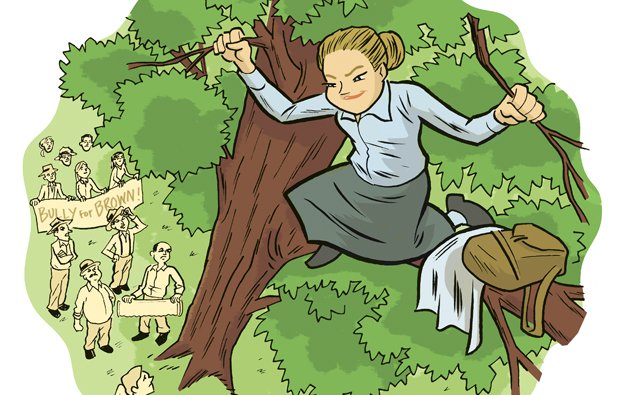Swapped suitcases cause stir in Staunton.

1914
It seemed like prohibition came early to Clifton Forge one Sunday when two men got their suitcases mixed up on a busy train and a former U.S. marshal wound up with a case brimming with alcohol. The marshal, Staunton’s R.A. Fulwiler, was the “innocent cause” of a “drouth” in Clifton Forge, because the spirited cargo never arrived. Fulwiler turned it over to the cops, who took it out of circulation. “PRESTO! CHANGO! FULWILER HAS NEW MAGIC STUNT, SUITCASE OF LINGERIE, SHIRTS, ETC., BECOMES FOUNTAIN OF BOOZE FOR EX-MARSHAL,” headed the story in the Staunton Daily Leader. Who, then, was in possession of Fulwiler’s bag, stuffed with his clothes and his wife’s lingerie?
Our marshal, returning home of a Sunday evening from a “little vacation,” had boarded a C&O car at Basic City (yes, Virginia, there was a Basic City, in Augusta County, but it has since been subsumed by Waynesboro), and laid his suitcase to rest with those of the other passengers. Debarking, he grabbed what he thought was his luggage and “abstracted” it from the train, but it wasn’t until the next day that he discovered the suitcase switch. He opened the case to select a shirt for the day and instead found that it contained “a dozen bottles of Schlitz” and a number of quarts of “old rye.” At this point, Fulwiler finally thought to check the luggage tag, on which he read the name of a well-known denizen of Clifton Forge, who went unnamed in the article but evidently had high hopes of averting an “incipient drouth” in his hometown. By this time, the Clifton Forge man must have been parched indeed, having discovered only shirts and lingerie in his case.
Amends were ultimately made and each suitcase returned to its rightful owner. The paper would not reveal what was in the bottles that were finally delivered to the Clifton Forge man but suggested that he would be smart to examine carefully their contents before sampling, lest they contain only water, which he “can get at home, fresh from the mountainside, and does not have to go to Norfolk to obtain.”
Why didn’t Fulwiler suspect that he had been the victim of a switcheroo? He said he noticed that the case seemed heavy; didn’t that give him pause? Perhaps he had indulged in a nip or two in the dining car. “Ardent spirits” were not illegal in Virginia. Not yet. What was illegal was such ardent transport of spirits, even within the Commonwealth—too much liquor from too far away.
Teetotaling became law here following a 1916 referendum, three years before the rest of the country went dry, according to the Journal of the Brewery History Society. The vote made a success out of the political rages led by the Woman’s Christian Temperance Union and the Anti-Saloon League. Temperance had been on the back burner in the antebellum period but picked up momentum around the turn of the century. Once it kicked in, Prohibition in Virginia lasted until 1933, but the Clifton Forge booze traveler must have felt this shock ahead of schedule when he discovered the facultative dryness that had befallen him. He must have been sad, too, because when you’re out of Schlitz …
Dogs Vex Grit Woman/ 1989
Shirley Hendricks, of Grit, in Pittsylvania County, is fit to be tied over roaming dogs that are terrorizing her geese. While she stops short of espousing a leash law—all she wants is for folks to take responsibility for their animals—she does call the Altavista Journal to complain. The county dog warden, who “can’t get around to everybody,” tells Shirley to “shoot a dog if it has a bird in its mouth,” but she says, “I hate to shoot somebody’s dog.” Even without a leash law, owners ought to confine their animals to their land, she says, but they don’t, and last year, dogs killed several Hendricks kittens. (The Hendrickses keep cows, chickens and birds as well.)“I get real aggravated,” she says.
Amherst Cat Arizona Bound/ 1964
Forgive Caledonia Fauber if she’s taking her upcoming trip to Flagstaff and points west in stride. This isn’t the first trip for the well-traveled Caledonia, 7, a seal point Siamese cat, reports the Amherst New Era-Progress. Car travel is second nature for her, and she has motored as far south as Key West, Florida and as far north as Circle City, Alaska. Her upcoming junket will take her to the Grand Canyon, Salt Lake City and Yellowstone National Park. Caledonia, described as a “mysterious female” with “that far-away look,” counts among her hobbies fishing and hunting. Her travel togs include a red collar anda chain leash.
An Ice Horse’s Meltdown/ 1939
A Richmond Ice Company horse and wagon stand outside a customer’s place on Richmond’s South Side. Suddenly the horse, bored, revs up and proceeds to haul ice through alleys and main thoroughfares, even for a while tearing down busy Hull Street. While onlookers thrill to the spectacle, Patrolman Gordon Smith, trying to stop the animal, decidedly does not. A few years back, before there were automobiles, this wasn’t a rare, or remarkable, occurrence, and the main concern was to keep “Johnny or Billy” out of the path of the charging steed. Things are trickier now. Smith finally nabs the nag on McDonough, but not before the horse and the rig have damaged nine cars, reports the Southside News. Whoa, Nelly!









